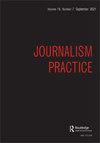Truth on Demand: Influences on How Journalists in Italy, Spain, and Bulgaria Responded to Covid-19 Misinformation and Disinformation
IF 2
2区 文学
Q2 COMMUNICATION
引用次数: 1
Abstract
ABSTRACT The COVID-19 pandemic significantly disrupted fundamental social institutions, and the media was no exception. Journalists were challenged to report on an outbreak of pressing health-related information, complicated by malinformation erupting in a time of enhanced public demand for reliable facts. This study uses in-depth interviews with journalists at leading news outlets- both public service and commercial, in Italy, Spain, and Bulgaria (N = 24) to examine how they responded to misinformation and disinformation arising in the initial months of the pandemic. Using the frameworks of journalistic epistemology and the hierarchy-of-influences model, we explored the norms, routines, and practices guiding journalists’ truth claims as well as the individual, routine, organizational, and social-systems influences shaping their decision-making. We found three common narratives of conspiracy theories consistent across different media systems: “big state” concerns, evident in people questioning the very existence of the coronavirus as a pretense for globally enforced state supervision on individual freedoms; “big pharma,” or people blaming the lack of a cure for COVID-19 on pharmaceutical companies pushing for vaccinations; and “big fear” attitude - falsehoods about vaccines potentially causing more harm than good, including changing people’s DNA. We also discuss three common strategies journalists used to respond to COVID-misinformation: deflecting, countering and false equivalency approach.按需真相:对意大利、西班牙和保加利亚记者如何应对新冠肺炎错误信息和虚假信息的影响
本文章由计算机程序翻译,如有差异,请以英文原文为准。
求助全文
约1分钟内获得全文
求助全文
来源期刊

Journalism Practice
COMMUNICATION-
CiteScore
5.50
自引率
14.30%
发文量
111
期刊介绍:
ournalism Practice provides opportunities for reflective, critical and research-based studies focused on the professional practice of journalism. The emphasis on journalism practice does not imply any false or intellectually disabling disconnect between theory and practice, but simply an assertion that Journalism Practice’s primary concern is to analyse and explore issues of practice and professional relevance. Journalism Practice is an intellectually rigorous journal with all contributions being refereed anonymously by acknowledged international experts in the field. An intellectually lively, but professionally experienced, Editorial Board with a wide-ranging experience of journalism practice advises and supports the Editor. Journalism Practice is devoted to: the study and analysis of significant issues arising from journalism as a field of professional practice; relevant developments in journalism training and education, as well as the construction of a reflective curriculum for journalism; analysis of journalism practice across the distinctive but converging media platforms of magazines, newspapers, online, radio and television; and the provision of a public space for practice-led, scholarly contributions from journalists as well as academics. Journalism Practice’s ambitious scope includes: the history of journalism practice; the professional practice of journalism; journalism training and education; journalism practice and new technology; journalism practice and ethics; and journalism practice and policy.
 求助内容:
求助内容: 应助结果提醒方式:
应助结果提醒方式:


